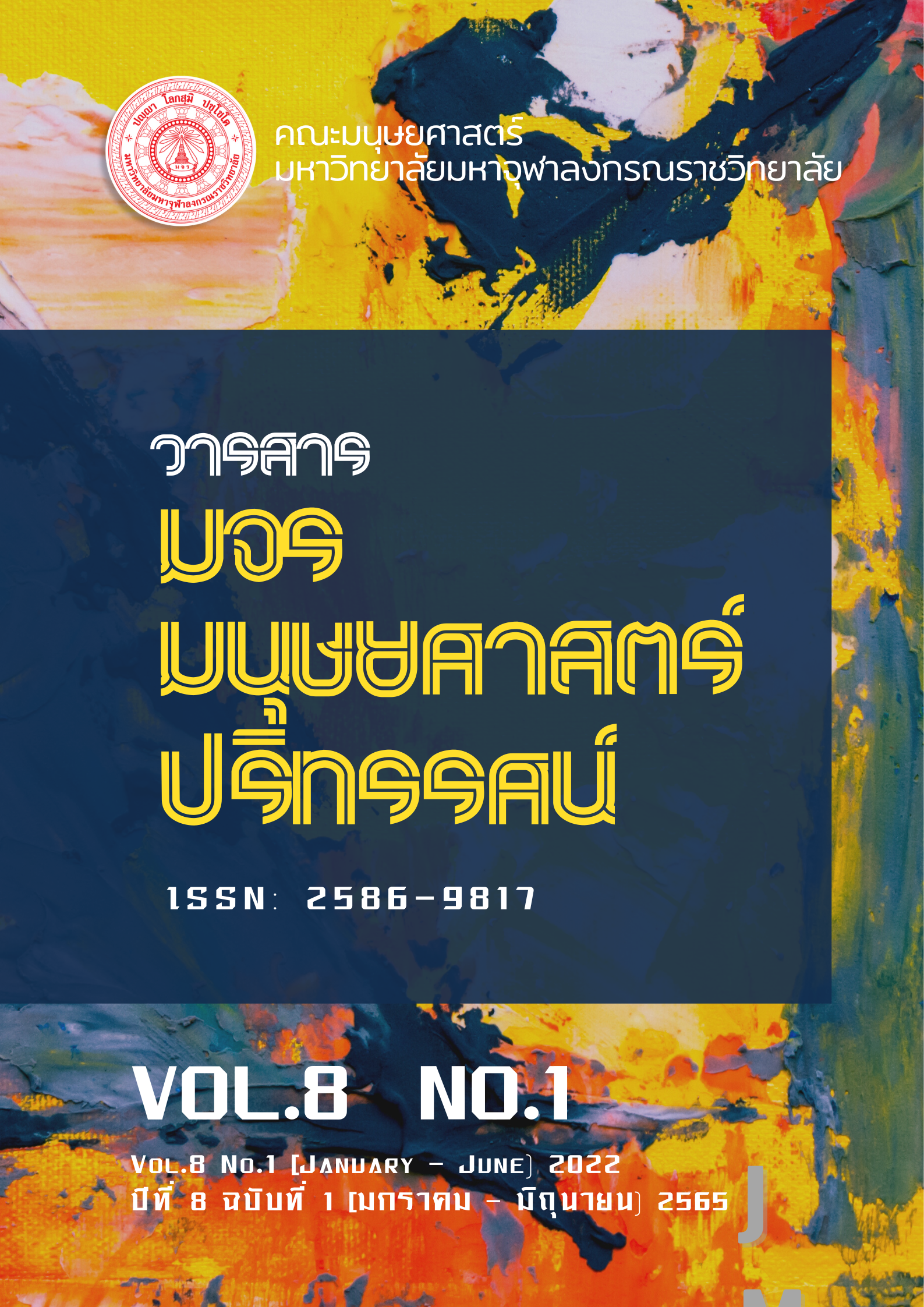การฟังอย่างลึกซึ้งเพื่อเยียวยาความทุกข์ตามหลักพุทธจิตวิทยา
คำสำคัญ:
การฟังอย่างลึกซึ้ง, การเยียวยา, ความทุกข์, หลักพุทธจิตวิทยาบทคัดย่อ
บทความวิชาการนี้ มีวัตถุประสงค์เพื่อ 1) นำเสนอให้เห็นถึงความสำคัญของการฟังอย่างลึกซึ้งต่อการเยียวยาความทุกข์ และ 2) นำเสนอหลักพุทธธรรม ได้แก่ กัลยาณมิตรธรรม 7 สังคหวัตถุ 4 พรหมวิหาร 4 และสติสัมปชัญญะและแนวคิดทางจิตวิทยา ได้แก่ ความสามารถในการเข้าใจความรู้สึกของผู้อื่น เพื่อเสริมสร้างการเป็นผู้ฟังที่มีหัวใจเมตตากรุณา การฟังอย่างลึกซึ้งหรือการฟังด้วยหัวใจเมตตากรุณา เป็นการฟังอย่างมีสมาธิเพื่อเชื่อมโยงให้สามารถรับรู้และเข้าใจถึงสภาวะภายในจิตใจของคู่สนทนาด้านอารมณ์ ความคิดและความรู้สึก เป็นการฟังอย่างไม่มีเงื่อนไข ไม่มีอคติ ไม่ขัดแย้ง ไม่ตัดสินและมีส่วนร่วมในความรู้สึกนั้น ในขณะเล่าเรื่องราวคำพูดที่สอดแทรกผ่านอารมณ์และความรู้สึกจะช่วยให้ผู้พูดได้เรียบเรียงและคิดทบทวนเรื่องราวต่าง ๆ ทำให้มองเห็นและเข้าใจสาเหตุของปัญหา มีมุมมองต่อปัญหาหรือเหตุการณ์ที่เกิดขึ้นแตกต่างไปจากเดิม ทำให้สามารถแก้ปัญหาและตัดสินใจได้ด้วยตนเอง ผู้ฟังที่มีหัวใจเมตตากรุณาจะช่วยให้คู่สนทนารู้สึกปลอดภัยและผ่อนคลายความตึงเครียด ไม่รู้สึกโดดเดี่ยวหรือถูกทอดทิ้งให้เผชิญปัญหาเพียงลำพัง การฟังอย่างลึกซึ้งช่วยให้คู่สนทนาได้คลี่คลายความทุกข์ มีสติสัมปชัญญะและมีกำลังใจในการเผชิญปัญหาและฝ่าฟันอุปสรรคเพื่อปลดเปลื้องความทุกข์ของตนได้
เอกสารอ้างอิง
กรมสุขภาพจิต. (2562). จน-เครียด-ฆ่าตัวตาย วาระสังคมสำคัญที่ต้องพูดถึง. สืบค้น 14 กันยายน 2564, จาก https://dmh.go.th/news-dmh/view.asp?id=29900
“_______”. (2563). 10 กันยายน วันป้องกันการฆ่าตัวตายโลก กับ 10 เรื่องที่ควรรู้!. สืบค้น 14 กันยายน 2564, จาก https://www.dmh.go.th/news- mh/view.asp?id 30428
“_______”. (2564). “ฆ่าตัวตาย” (Suicide) บาดแผลที่รอการเยียวยา. สืบค้น 14 กันยายน 2564, จาก https://www.dmh.go.th/news-dmh/view.asp?id=31002
กลุ่มงานพัฒนาวิชาการและประชาสัมพันธ์ โรงพยาบาลจิตเวชนครสวรรค์. (2563). วิธีจัดการกับความคิดอยาก “ฆ่าตัวตาย”. สืบค้น 2 กรกฎาคม 2564, จาก https://nph.go.th/?p=4877
จิณห์จุฑา ชัยเสนา ดาลลาส. (2558). ความเข้าอกเข้าใจ: พลังเพื่อพัฒนาอาชีพพยาบาล. วารสารพยาบาลสาธารณสุข, 10(1). สืบค้น 14 กันยายน 2564, จาก https://he02.tci-thaijo.org/file:///C:/Users/User/Downloads/39491-Article%20Text-90027-1-10-20150910%20(4).pdf
ชวัลรัตน์ บูรณากาญจน์. (2556). ทฤษฎียึดบุคคลเป็นศูนย์กลางการบำบัดรักษาของ คาร์ล อาร์ โรเจอร์. สืบค้น 2 กรกฎาคม 2564, จาก http://chwrbrnk.blogspot.com/2013/02/blog-post_8341.html
ดิลก ถือกล้า. (2564). Empathy และพรหมวิหาร 4: ความเหมือนจากสองฝั่งโลก. สืบค้น 14 กันยายน 2564, จาก https://www.posttoday.com/economy/columnist/659400
ตะวัน วาทกิจ. (2557). ความทุกข์ทางใจในบริบทพุทธธรรม. วารสารวิจัยราชภัฏเชียงใหม่, 15(1), 113-114.
ทีมงานความสุขประเทศไทย. (2560). Deep Listening: ฟังกันอย่างเมตตากรุณา. สืบค้น 4 กันยายน 2564, จาก https://www.happinessisthailand.com/2017/08/30/deep-listening/
พระอธิการประกาสิทธิ์ สุจิณฺโณ (กลิ่นชื่น). (2561) . ศึกษาสติสัมปชัญญะที่ปรากฎอยู่ในโพธิปักขิยธรรม ในการปฏิบัติวิปัสสนาภาวนา (ปริญญานิพนธ์ปริญญามหาบัณฑิต). มหาวิทยาลัยมหาจุฬาลงกรณราชวิทยาลัย. พระนครศรีอยุธยา.
พระไพศาล วิสาโล. (2558). ฟังด้วยใจ. สืบค้น 14 กันยายน 2564, จาก http://jitwiwat.blogspot.com/2015/01/blog-post.html
ภานุวังโส และมิน ซอง ซิน. (2549). เกินกว่าฟรอยด์จะจินตนาการ. กรุงเทพฯ: เคล็ดไทย.
มนต์ชัย พินิจจิตรสมุทร, ดร. (2552). Dialogue สุนทรียสนทนา : ศาสตร์แห่งการสร้างสรรค์สติปัญญา. สมุทรปราการ: จงเจริญเทพารักษ์การพิมพ์.
วนิดา ผาระนัด (2558). ทฤษฎีตัวยู (Theory U). วารสารวิจัยเพื่อพัฒนาสังคมและชุมชน มหาวิทยาลัยราชภัฏมหาสารคาม, 2(4), 29-35.
วรภัทร์ ภู่เจริญ, ดร. (2552). Dialogue คิดสู่ใจ ไหลเป็นปัญญา. กรุงเทพฯ: สามลดา.
วิธาน ฐานะวุฑฒ์, นพ. (2009). ทฤษฎีที่จะทำให้ชีวิตชัดเจน. สืบค้น 14 กันยายน 2564, จาก https://www.bloggang.com/mviewdiary.php?id=oddicer-pam&month=02-2010&date=27&group=13&gblog=1
วัลภา ฐาน์กาญจน์. (2563). การฟังอย่างลึกซึ้ง (Deep Listening). สืบค้น 14 กันยายน 2564, จาก http://hsmi2.psu.ac.th/upload/forum/paper_1516_ 5f0ab2e81b82a5f0ab2.pdf
สตางค์ ศุภผล (2560). การประยุกต์ใช้จิตตปัญญาศึกษาในบริบทแพทยศาสตรศึกษา. สืบค้น 14 กันยายน 2564, จาก https://he02. tci-thaijo.org/index.php/tmj/article/download/99404/77251/
สมเด็จพระพุทธโฆษาจารย์ (ป.อ. ปยุตฺโต). (2561). พจนานุกรมพุทธศาสตร์ ฉบับประมวลธรรม (พิมพ์ครั้งที่ 41). กรุงเทพฯ: ผลิธัมม์.
“_______”. (2562). พุทธธรรม ฉบับปรับขยาย (พิมพ์ครั้งที่ 52). กรุงเทพฯ: ผลิธัมม์.
โสฬส ศิริไสย์. (2548). Dialogue: วิธีการสนทนาแบบมนุษย์สัมผัสมนุษย์และการเปลี่ยนวิธีคิดด้วยการฟังอย่างลึกซึ้ง. สืบค้น 19 กรกฎาคม 2564, จาก https://dol.thaihealth.or.th/resourcecenter/sites/default/files/documents/withiikaarsnthnaaaebbmnusysamphasmnusyaelakaar.pdf
Learning Hub Thailand. (2561). Deep listening การฟังอย่างลึกซึ้งคืออะไร?. สืบค้น 12 มิถุนายน 2564, จาก https://learninghubthailand.com/deep-listening
Roger, C.R. (1951). Client-Centered Therapy: Its Current Practice, Implications, and Theory. Mifflin, Houghton: MI.
“_______”. (1967). Psychotherapy and Personality Change. Chicago: University Press.

ดาวน์โหลด
เผยแพร่แล้ว
รูปแบบการอ้างอิง
ฉบับ
ประเภทบทความ
หมวดหมู่
สัญญาอนุญาต
ลิขสิทธิ์ (c) 2022 วารสาร มจร มนุษยศาสตร์ปริทรรศน์

อนุญาตภายใต้เงื่อนไข Creative Commons Attribution-NonCommercial-NoDerivatives 4.0 International License.





